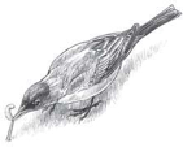Biology Reference
In-Depth Information
flies to a communal robin roost, and they follow. He will start focusing on his new nest-
lings after they hatch; by then the fledglings will be independent.
Scratching and Flying
As its feathers start to grow, a young robin scratches with its beak and claws, an innate
behaviorthatisclumsyatfirst.Thebirdquicklyimprovesitstechnique bylearningwhat
movements are most comfortable and effective. The young bird innately flaps its wings,
and the combination of feather growth, developing muscles, and learning refines those
initial awkward efforts into skillful flying.
Making More Robins
Robins are drawn to other robins in big, loose flocks. They stay safe and discover new
food sources thanks to the many eyes and ears of the group, until rising hormone levels
in spring induce territorial and breeding behaviors. These behaviors are innate but are
alsorefinedbytheresponsestherobingetsandhowsuccessfuleachbehavioris.Singing
robins refine their songs and add phrases unique to the neighborhood they nest in, even
though they may have been raised far from there.
When robins lose their young, they move to a new site to re-nest, and sometimes a
pair breaks up. If they successfully raise a brood, the same pair will often re-nest two or
even three times that season. Although robin pairs work together in raising their young,
their bond isn't quite what romanticists might like. In one study, “extra-pair paternity”
occurred in almost 72 percent of all broods. In each of these “EPP” nests, at least one
chick wasn't fathered by the male taking care of it. According to that study, females may
be allocating paternity based on their assessment of each male's parental performance.
Females invest a great deal into their eggs, and multiple fathers hedge their bets.
If a mate is killed, sometimes another male will take over rearing the chicks. In my
own backyard, a Cooper's Hawk once killed the male robin nesting in my hedge. The
next day, the female had accepted a new mate who helped her feed her nestlings. I
wondered if he was the genetic father of one or more of the nestlings, but he apparently
never insisted on a paternity test.


